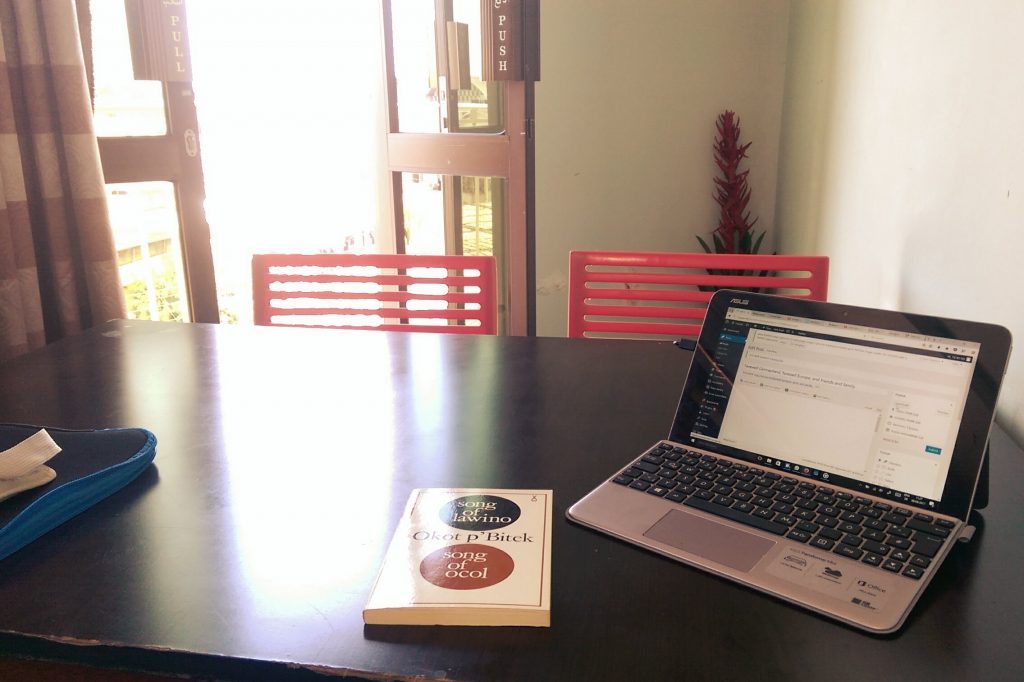A recording I’ve made for a class this term. Perhaps I should do this more often.
Category Archives: Literature
Grit Lemke: Kinder von Hoy
Es ist ja nicht so, dass nix über den Osten geschrieben würde; im Gegenteil: in der jüngeren Vergangheit gab’s geradezu ne Flut an Büchern und Beiträgen. Flut ist halt auch das Bild, das strapaziert wird bei Migration – das Bildmotiv kann nun jede selber ergänzen. Unter den ersten Sachen, die je über den Osten erschienen sind, war dafür auch viel Mist – manchmal in der heiteren Variante der Komödie. Grit Lemkes Kinder von Hoy allerdings ist nunmal ein Buch, das ich irgendwie auch bewohne, ohne jemals in Hoy gewesen zu sein. Trotzdem kenn ich mich darin aus, und es fühlt sich mal gut an, sich in einer Bücherwelt auszukennen, sich mit-erzählt zu wissen, buchwürdig, mit allen Tugenden und Untugenden, sie halt das Leben ausmachen. Ich hab’s noch nicht durch, aber zusammen mit Kairos von Jenny Erpenbeck sind das nun endlich mal angemessene literarische Versionen des “Ostens”. Kairos sehr allegorisch und episch, und Hoy halt Hoy, eher proletarischer Stil. Und so muss det och sin.
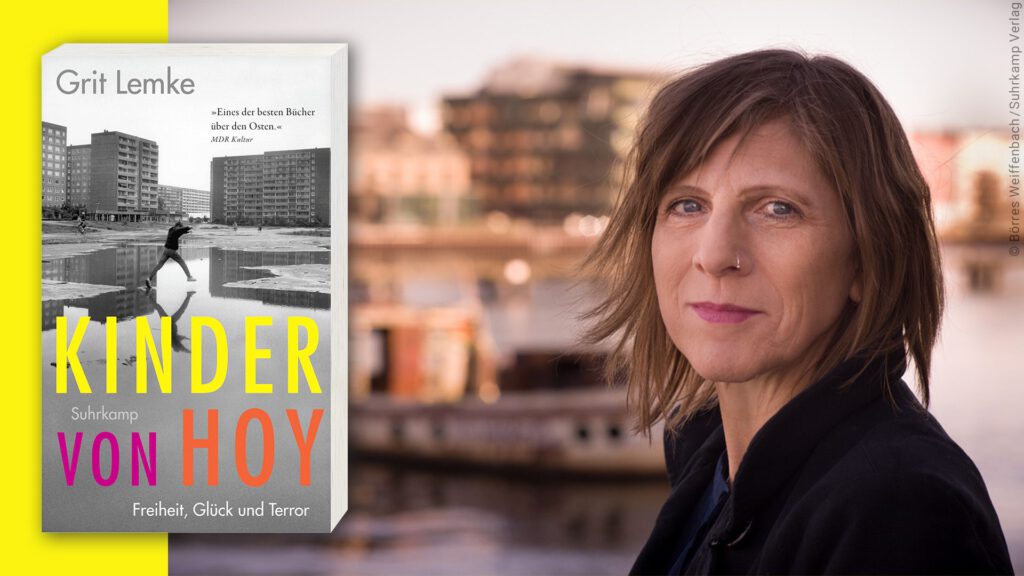
Gittersee
… ist zunächst mal ein Roman (von Charlotte Gneuß), den ich nicht gelesen habe. Kommt noch, vielleicht. Angeblich erregt er Erregung im “Literaturbetrieb”, so schreiben einige Fäuletongs, wobei das vermutlich sie selber meint. “Darf sie das?”, d.h. einen in der DDR angesiedelten Roman schreiben, wo sie doch da und damals nie gelebt hat?! Die einfache Antwort auf eine schlecht gestellte Frage: na klar darf sie das. Kann sie es? – das ist eventuell, je nach Maßstab, etwas anderes. Hier mal ein Vergleich: vor vielen Jahren als der erste Band einer Buchreihe mit dem Titelhelden Harry Potter erschien, erzählte mir mein Englisch- und Übersetzungslehrer James Fanning von seinem Leseerlebnis. Er hatte sich die billigere amerikanische Ausgabe geholt, die hieß H.P. and the Sorcerer’s Stone und nicht wie das britische Original H.P. and the Philosopher’s Stone. Das war verkraftbar. James gefiel der Ton der Erzählerin – Mittelklasse, authentisch (oder so) nannte er das. Bis auf einmal im Text das Wort sneakers für Turnschuhe auftauchte. Damit war der britisch-englisch klingende Text dahin. Ein amerikanischer Eindringling hatte die trainers des Originals verdrängt (d.h. der amerikanische Verlag hatte das veranlasst), und für meinen sprachbewussten Lehrer-Freund war der Text an der Stelle nicht mehr von der gleichen Qualität. Das Buch musste er nicht verbrennen, auch J.K. Rowling nicht verklagen oder einen shitstorm anzetteln (das gab’s auch noch nicht damals, wäre aber auch nicht seine Art) – nein, er wusste, dass er beim nächsten Mal keine amerikanische Parallelausgabe kaufen würde.
Kulturimperialismus
Der Autor (Alan Posener) dieses ungemein beschränkten Kommentars “Nein, die Kultur der DDR war nicht cool” ist Autor des Buches Olli aus Ossiland. Das firmiert als Deutsche Lektüre für das GER-Niveau A2-B1 (Teen Readers (DaF)) beim Klett Verlag. Seine Biographie mag sich spannend lesen, einschließlich KPD-AO und drohendem Berufsverbot und immerhin Rausschmiss bei der sog. “Achse des Guten”. Nur: im Osten ist er nicht aufgewachsen, und seine Haltung dem Osten gegenüber ist wohl eher von Platitüden und Ressentiments geprägt. Und dann ein Ossi-Buch für Integrationskurse? Ohne es gelesen zu haben (mach ich’s?/mach ich’s nicht?) würgt es mich in der Kehle … Das heißt übrigens nicht, dass ich summarisch die Kultur der DDR als “cool” bezeichnen würde. Nee, ich würde gar nicht erst von “der” Kultur der DDR sprechen.
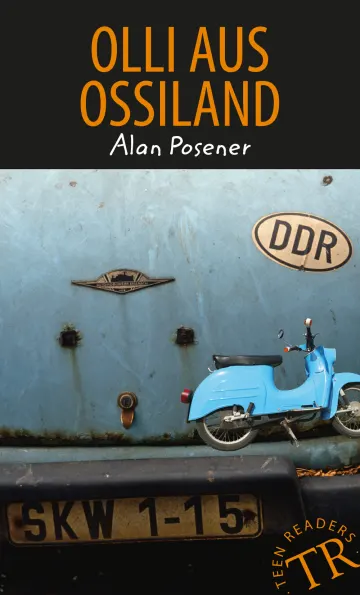
Ich hab mir den Olli aus Ostdeutschland (1997) geholt und sammle noch Symptome für? – mal schauen. Hier ein paar:
– Das Buch ist dezidiert für Deutschlerner empfohlen (B2) und hat daher Erklärungen einzelner Wörter. Zu “Ossiland” heißt es “Vorsicht! – das ist ein Schimpwort!” [sic]. Nichtsdestotrotz heißt der Ich-Erzähler Olli aus Ossiland.
– Anderes braucht keine Erklärung, z.B. wenn 1990 in dem erfundenen Hohenroda die Nationalhymne mit “Deutschland, Deutschland über alles” gesungen wird. Das darf einfach so dastehen. Auch für DaF-Lerner
– Klar, Ost-Cola (von nem Ossi wie Olli sicher nie so bezeichnet, sondern eher “West-Cola” für die anderen) schmeckt textlich-penetrant nach Medizin, eine Schwalbe sei ein Kleinmotorrad, jemand sei bei der Volksarmee, der vor Ort sicher “bei der Fahne” gewesen wäre, und viele stereotype Ingredienzien geben sich die Hand.
– Interessant ist die Lage Dresdens auf der Karte (etwa da, wo eigentlich Karl-Marx-Stadt, ähhh, Chemnitz liegt) – macht aber nix, weil von dem im Text zumindest nahe bei Dresden gelegenen Hohenroda sind’s immerhin 300 km nach Berlin. Vom richtigen Dresden sind’s nur 200, da muss also Posener in Berlin noch etwa 100km um sich selbst zirkuliert sein.
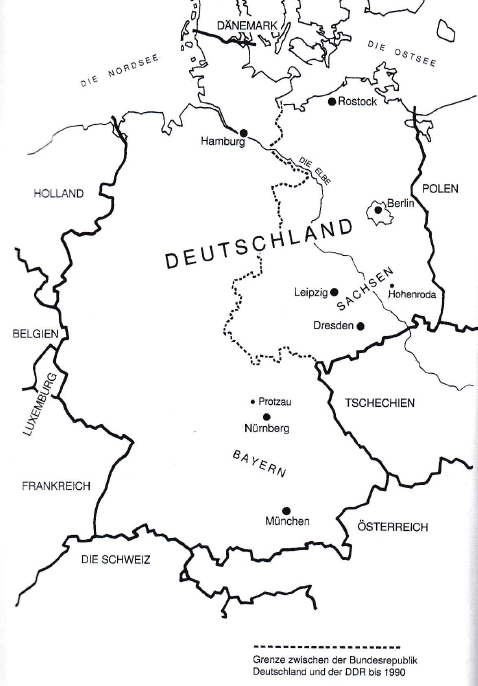
Aus einem Kommentar von G.W.: “ein -roda-Ortsname in der verorteten Gegend kommt definitiv schwerlich vor. Wie schlecht recherchiert kann das Buch sein? Wahnsinn.”
Drones and literature
I’ve been following Teju Cole for a while, and like what and how he writes, and his playlists. This is from seven years ago, about Obama’s drone warfare., his “A reader’s war“, which appeared in The New Yorker in 2013, February 10. Cole starts out by praising the “reader in chief” Obama for his erudition that is so welcome after the anti-intellectual Bush years. Then there are the drone wars, though, one bad guy killed at 17th attempt, the 16 fails leaving uncounted “collateral damage” behind, every one a human being killed – literally – out of the blue. Cole:
Continue readingI sit rigid in my seat, thinking, I don’t want to die, not here, not yet. I imagine those in northwest Pakistan or just outside Sana’a who go about their day thinking the same. The difference for some of them is that the plane is already hovering in the air, ready to strike.
Africa in books
… and books by African authors
Here are a few recommendations on books on African matters.
– texts to follow –
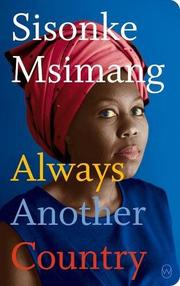
Bra Willie & Bra Hugh
Since my arrival, two of South Africa’s greats have left us – first South African poet laureate Keorapetse William Kgositsile, or “Bra Willie” (d. 3 January), and now the father of African jazz and ambassador of African culture, Hugh Masekela, “Bra Hugh” (d. 23 January). Both were fighters for African freedom, which for both of them meant many years of exile from the South Africa under the Apartheid regime. Their view of African freedom was not only that of politics, it goes deeper, and targets what Frantz Fannon had called the “white masks” in black skin. Needless to mention, the arts, music, all of cultural heritage were, and shall I say, are vital (pun intended) in their fight.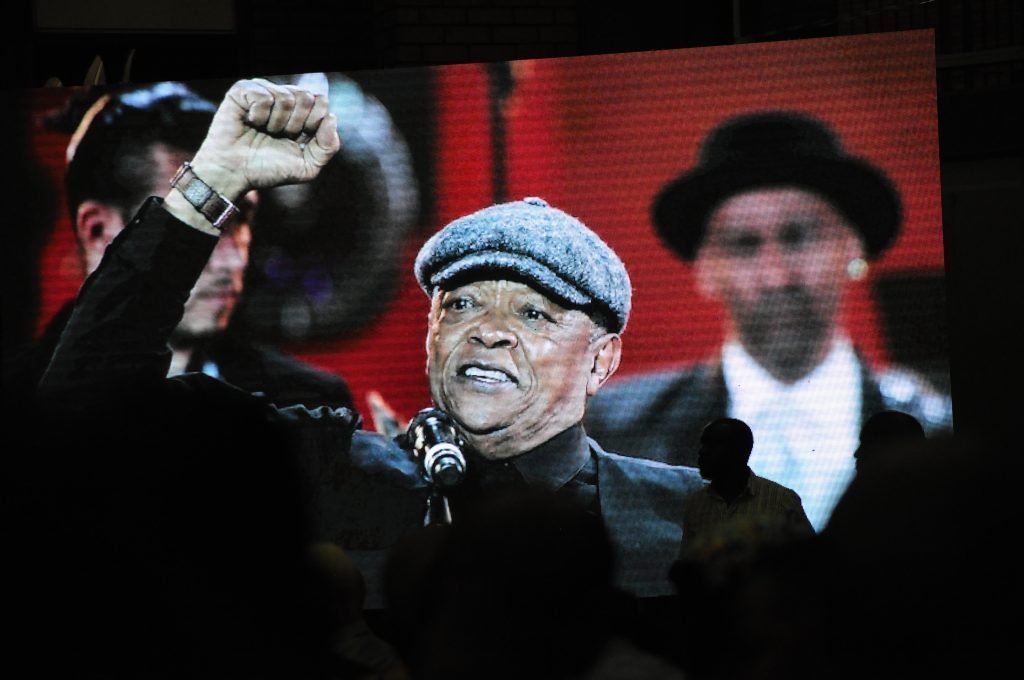 Continue reading
Continue reading
On Racism and Othering
The following text is partly in response to friends or anyone really who is rightfully upset and hurt by ongoing racism in the world. My fear is that this pain makes it more and more difficult for us to engage openly, and to challenge ourselves and our prejudice, or if you like: myself and my prejudices. I sense that a lot of people on the receiving end of racism are fed up with finding themselves in a position where they are asked to explain or end racism or are asked to forgive, more so than those who commit acts of racism, directly or indirectly, are willing to do the work to overcome it, or even look at potential racist behaviour, or to admit to their position of privilege.
It’s become longer than I thought, and I believe what truth there is in it is personal, thus not necessarily The capital-T Truth.
Gulu #2: Okot p’Bitek
Gulu is also the town where Okot p’Bitek was born. A friend from Zambia (hey there!, you know who you are 😉 ) recently introduced me to his best-known book, The Song of Lawino (1966). It’s a wonderful lament of a wife about her all-too European husband. He, Ocol, will respond later, in The Song of Ocol (1970). Very interesting author and scholar – read more here and here in German.

